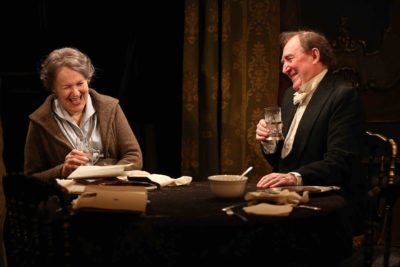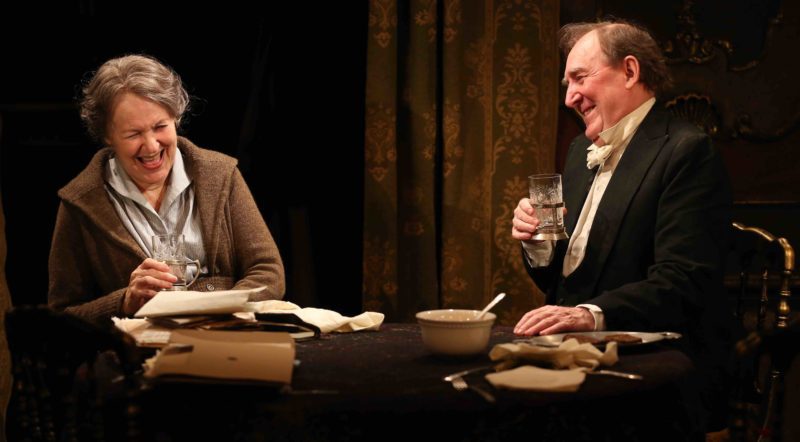INTERVIEW: Dermot Crowley explores Chekhov via Brian Friel at Irish Rep

Afterplay, the Brian Friel play that is currently running at the Irish Repertory Theatre in New York City, stars Dermot Crowley and Dearbhla Molloy as two characters from the world of Anton Chekhov who meet in a cafe one night in Moscow. The 70-minute two-hander, running through Nov. 6 at the West 22nd Street venue, pits Sonya from Uncle Vanya against Andrey from The Three Sisters. For fans of Friel and Chekhov, the evening is irresistible.
Crowley and Molloy are not newcomers to Irish Rep, a venerable institution that celebrates Irish playwrights. “Well, Dearbhla Molloy who plays Sonya with me, she and I worked at the Irish Rep. about three or four years ago with the show that we had devised ourselves based on the poetry of Paul Durcan called Give Me Your Hand, and we played it for a month,” Crowley said recently in a phone interview. “It did really well at the time, and so we knew [co-founder] Ciarán O’Reilly very well. And we were looking for another project. Dearbhla came up with Afterplay because she had worked extensively with Brian. She was in the original Dancing at Lughnasa, and I did Translations on Broadway. So we always adored his writing, and Afterplay seemed to be a perfect gem that we could work on together.”
Crowley said Friel, the late playwright known for Faith Healer among many other productions, actually translated Chekhov’s The Cherry Orchard and Uncle Vanya, so the scribe had a sensibility for the Russian great and was immersed in the world of Afterplay.
“He just carried it on I think magnificently,” Crowley said of Friel’s efforts. “I mean the structure of Afterplay is incredibly Jacobean, and it’s a joy to do. So it’s kind of an acting challenge for the two us, and we were blessed to have Joe Dowling directing it because Joe knows far, far more about Chekhov and about Brian than I ever did. He was enormously helpful in getting us to sort of peel away all the layers that are there in the play because it’s quite staggering how the characters very gently, but very deeply, over an hour reveal themselves to the depths of their souls really, and Joe was great at that, getting us to dig deep.”
Crowley’s character of Andrey is someone who continues to live in the shadows of his father’s memory. The character’s father was extremely successful and domineering, and probably had great expectations for Andrey. These expectations were never fully realized, and this leaves Andrey feeling lonely and somewhat guilty.
Andrey was also in a family with three sisters married against their approval (hence the title of Chekhov’s original piece). “The way Bryan has reimagined him [Andrey] is extraordinary in that he’s barely holding his life together,” Crowley said. “His children, one of whom is in jail, the other one is somewhere in Kazakhstan, neither of them having fulfilled the dreams and hopes he had for them, and he lives a life of delusion and puts up these fronts to help him survive, I think. And that’s what’s all revealed in the course of the play. We learn all that, some of it more subtly than others, and that’s what’s fascinating about it. All of us in our own lives present fronts to the rest of the world, and I guess it’s when we can reconcile our public and our private together that we’ll probably find peace and happiness.”
Molloy’s Sonya is also keeping up pretenses against the world and suffering from hopelessness and issues of love. Afterplay, despite the Chekhovian drama, still offers a glimmer of hope — even if it’s just a glimmer. “The audience leaves the theater with all these questions buzzing around their heads, and they’ve only been there for 70 minutes,” Crowley said. “But it’s the most complete and rich feast, I think, you could possibly have with the time.”
The intimacy of the downtown space of the Irish Repertory Theatre allows Afterplay to feel like it’s being performed in someone’s living room. The theater seats little more than 60 people, and the actors can literally reach out and touch the audience members.
The audience is “eavesdropping on our two characters, and that’s what we try to achieve in rehearsal, that these people are meeting and are saying these things for the very first time,” the actor said. “We’re trying to make sure that there’s as little acting as possible in the production and that people are seeing a real event in real time in that wonderful set by John Lee Beatty. It’s just extraordinary. That’s what the buzz is. Talking to people afterward, they have such a good time, and we do too because the kind of audiences that are kind to it are the best of New York audiences. They’re intelligent. They’re articulate. They’re sensitive. Most nights we go out, and you could hear a pin drop because they’re absolutely aching to drink in every word of Brian’s play. I’ll be very sorry to say goodbye to it when the run finishes.”
When Crowley looks for a new project, be it theatre, TV or film, he usually focuses on the writing. He wants the story to pop off the page and to see the character come to life.
“I do a series called Luther for the BBC, which has been going for four or five years now,” Crowley said. “All of that is written by the same writer who now knows his actors so well that he kind of writes for us. … Years and years ago one of the very first things I did in New York I did Conor McPherson’s The Weir, which is such an amazing play. … I read it, and I couldn’t stop reading it. As soon as I finished reading it, I started all over again. It was totally and utterly magical.”
The connection among Luther, Afterplay and The Weir is that undeniably skilled writing.
“None of us would be able to do what we do if it wasn’t for the written word,” Crowley said. “In my book, the writer is king, and we’re there to serve the writer if the writing deserves it properly. And certainly in Brian Friel’s mastery writing, it does all the time.”
By John Soltes / Publisher / John@HollywoodSoapbox.com
Afterplay by Brian Friel and starring Dermot Crowley and Dearbhla Molloy is playing the Irish Repertory Theatre on West 22nd Street in New York City through Sunday, Nov. 6. Click here for more information.

